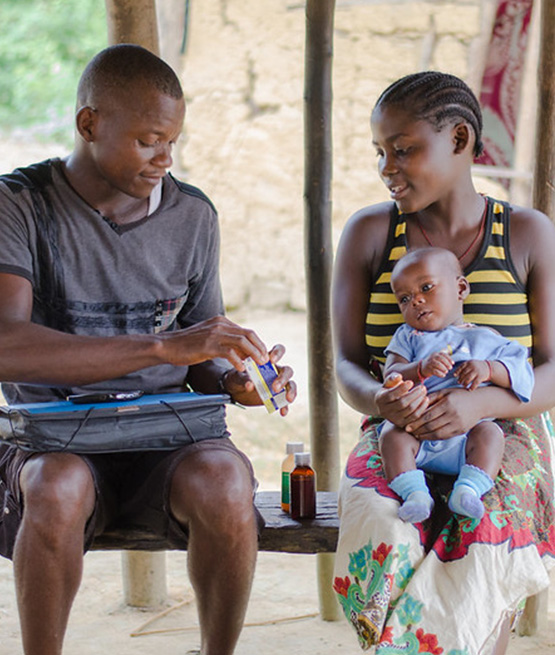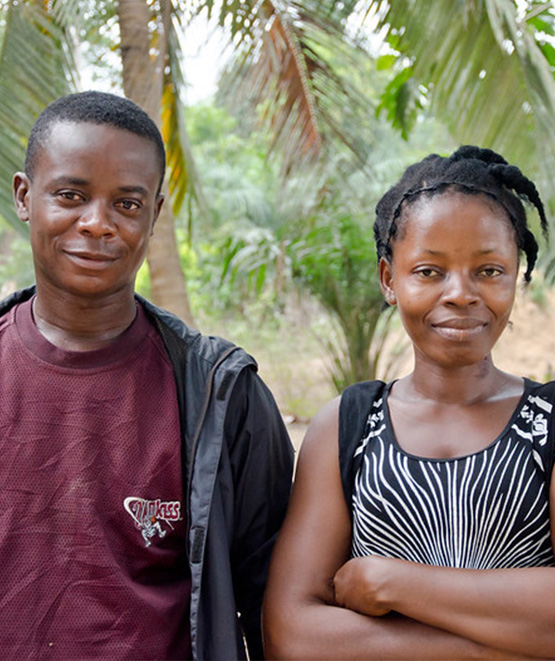Liberia’s National
Community Health Program
In partnership with Liberia’s Ministry of Health and peer organizations, we designed and launched the country’s first-ever national community health worker program in 2016. Today, the program is making primary healthcare access universal for Liberians in rural and remote communities. Across all 15 of Liberia’s counties, paid, professional community health workers deliver primary care, increase referrals to health facilities, rapidly respond to disease outbreaks, and educate their communities. Named a global exemplar, the country’s 4,000-strong community health workforce now diagnoses and treats 45% of malaria cases in the country for children under-five.
Liberia’s National Community Health Program
In partnership with Liberia’s Ministry of Health and peer organizations, we designed and launched the country’s first-ever national community health worker program in 2016. Today, the program is making primary healthcare access universal for Liberians in rural and remote communities. Across all 15 of Liberia’s counties, paid, professionalized community health workers deliver primary care, increase referrals to health facilities, rapidly respond to disease outbreaks, and educate their communities. Named a global exemplar, the country’s 4,000-strong community health workforce now diagnoses and treats 45% of malaria cases in the country for children under-five.
The origins of Liberia’s national program
In 2016, Liberia emerged from a two-year-long Ebola epidemic that claimed nearly 5,000 lives. The epidemic devastated the health system, already weakened by two civil wars. About 100 doctors remained to serve a population of more than four million, and an estimated 1.2 million Liberians lived more than 5 kilometers from the nearest health facility. Primary healthcare was inaccessible for the majority of rural Liberians.
However, a bright spot of the Ebola response was the engagement of communities across the country. Community members answered the call to serve when the government of Liberia asked for support in educating communities, tracing contacts, and rapidly referring patients to care in remote and rural areas.
The government of Liberia recognised the urgent need to strengthen the health system, and the opportunity to leverage the power of the community. In July 2016, six months after West Africa was finally declared Ebola-free, the Ministry of Health assembled a coalition of non-governmental organizations (including Last Mile Health) and funding partners to launch a national community health program. The program saw the deployment of a paid, professional community health worker to every rural and remote community in the country. Today, nearly 5,000 community and frontline health workers have been recruited, trained, supervised, equipped, and deployed.

However, a bright spot of the Ebola response was the engagement of communities across the country. Community members answered the call to serve when the government of Liberia asked for support in educating communities, tracing contacts, and rapidly referring patients to care in remote and rural areas.
The government of Liberia recognised the urgent need to strengthen the health system, and the opportunity to leverage the power of the community. In July 2016, six months after West Africa was finally declared Ebola-free, the Ministry of Health assembled a coalition of non-governmental organizations (including Last Mile Health) and funding partners to launch a national community health program. The program saw the deployment of a paid, professionalized community health worker to every rural and remote community in the country. Today, nearly 5,000 community and frontline health workers have been recruited, trained, supervised, equipped, and deployed.
An enduring partnership: the Ministry of Health and Last Mile Health
Last Mile Health is the lead partner to the Ministry of Health on the national program. In this role, we partner with the Ministry to assess the national program’s implementation, impact, and sustainability to ensure community health workers are supported to deliver the highest quality of care. In 2021, we conducted a gender assessment that examined the factors contributing to the low percentage of female community health workers in Liberia’s paid, professional workforce and determined only 17% of Liberia’s paid, professional community health workers were women. Together, Last Mile Health and the Ministry made a commitment to change this and developed a set of recommendations to increase gender parity in the community health workforce that were formalized in the new community health policy. Last Mile Health also directly implements the national program in three counties: Rivercess, Grand Gedeh, and Grand Bassa. Rivercess County is our innovation site, where we pilot innovative solutions to any gaps in the program. As an example, community health workers were trained to administer the injectable contraceptive Sayana Press in 2019, and is in the process of beinghas since been scaled nationally based on the success of the pilot. Throughout our partnership, we’ve provided guidance on key aspects of the national program, including policy, curriculum, and financing.

Last Mile Health is the lead partner to the Ministry of Health on the national program. In this role, we partner with the Ministry to assess the national program’s implementation, impact, and sustainability to ensure community health workers are supported to deliver the highest quality of care. In 2021, we conducted a gender assessment that examined the factors contributing to the low percentage of female community health workers in Liberia’s paid, professionalized workforce and determined only 17% of Liberia’s paid, professionalized community health workers were women. Together, Last Mile Health and the Ministry made a commitment to change this and developed a set of recommendations to increase gender parity in the community health workforce that were formalized in the new community health policy. Last Mile Health also directly implements the national program in three counties: Rivercess, Grand Gedeh, and Grand Bassa. Rivercess County is our innovation site, where we pilot innovative solutions to any gaps in the program. As an example, community health workers were trained to administer the injectable contraceptive Sayana Press in 2019, and is in the process of beinghas since been scaled nationally based on the success of the pilot. Throughout our partnership, we’ve provided guidance on key aspects of the national program, including policy, curriculum, and financing.
A new national policy
In 2023, the Ministry of Health launched its second national community health policy. Building on a comprehensive review with Last Mile Health and other partners, the new policy includes:
Rolling out a revised, competency-based curriculum and training to equip community health workers with the knowledge and skills they need to make the greatest impact in their communities.
Expanding the essential package of services provided by community and frontline community workers, including immunizations and more family planning options.
Introducing a nationwide electronic community-based information system.
Strengthening the commitment to increasing gender equity in the national program.
IMPACT
4,900 community and frontline health workers have been deployed
More than one million Liberians are served by community health workers.
Community and frontline health workers have treated more than one million childhood cases of pneumonia, malaria, and diarrhea
By 2020, community health workers diagnosed and treated 50% of confirmed malaria cases for children under the age of five
Join Us
TO BRING A HEALTH WORKER
WITHIN REACH OF EVERYONE,
EVERYWHERE.
SUPPORT OUR WORK >
